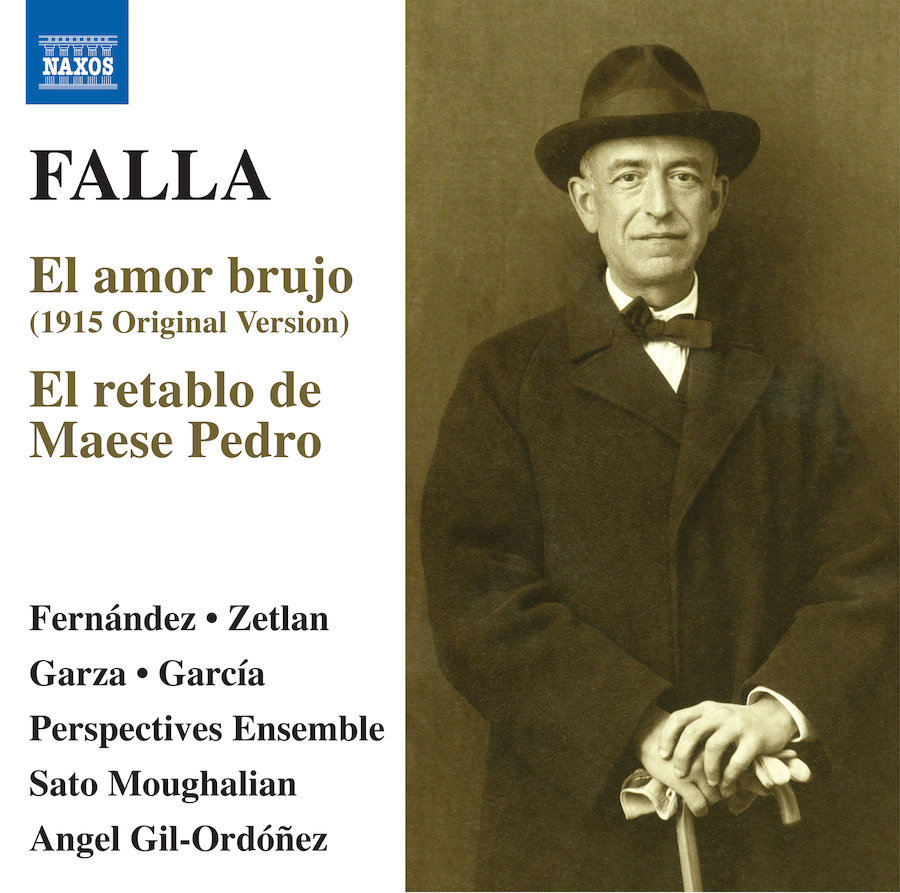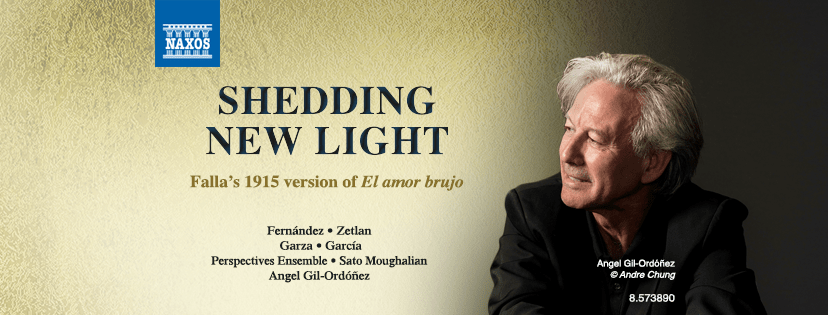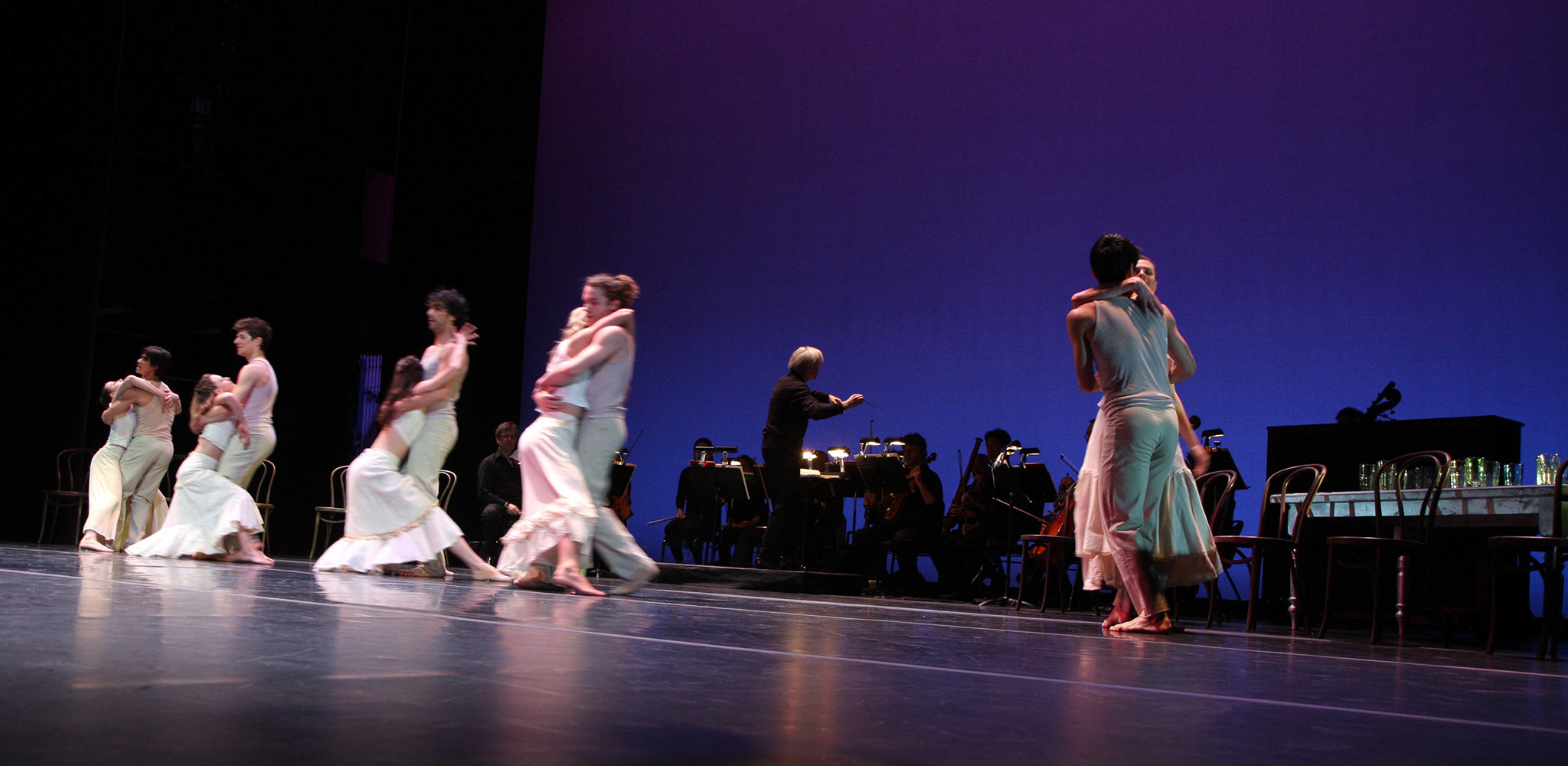Falla: El amor brujo (1915 original version) / El retablo de Maese Pedro
Summary

Angel Gil-Ordóñez seems to have stolen Eduard Toldrà’s baton, the tempos rush, the rhythms sharpen, the timbres fuse, making the work what it should be, a whirlwind, and leading in a skillful accelerando the tender or heroic episodes up to the carnage and the loving proclamation of the knight errant.
Jean-Charles HoffeléAvant Scène OPÉRA
Available on Spotify and Apple Music.
Manuel de Falla is renowned as the greatest Spanish composer of the early 20th century, melding diverse stylistic, folk or literary influences into distinctive new musical languages and forging masterworks that have become cultural emblems of his homeland. This synthesis can be found in the original 1915 version of El amor brujo, a heartfelt representation of a young Roma woman’s dramatic quest to free herself of the ghost of her lover. The mini-opera El retablo de Maese Pedro pays homage to Cervantes’ beloved Don Quixote using instrumentations and rhythms that conjure both Spain’s Golden Age and the vibrant energy of new European music in the 1920s.
Reviews
L'Amour sorcier. Les Tréteaux de Maître Pierre
Angel Gil-Ordóñez seems to have stolen Eduard Toldrà’s baton, the tempos rush, the rhythms sharpen, the timbres fuse, making the work what it should be, a whirlwind, and leading in a skillful accelerando the tender or heroic episodes up to the carnage and the loving proclamation of the knight errant.
Distinctive and Different Falla from Gil-Ordóñez
There have been a couple of recordings of El amor brujo in its original, two-act chamber version of 1915, but this one is as fine as any and just might be the best around. Conductor Angel Gil-Ordóñez chooses ideal tempos, the members of the Perspectives Ensemble play beautifully, and everyone seems genuinely involved in projecting Falla’s characterful instrumental parts with just the right combination of precision and warmth (…) Once again the performance is excellent from all concerned, and both pieces are very well recorded.
Ángel Gil-Ordoñez y Alfredo García
We spoke with Ángel Gil-Ordóñez and Alfredo García, director and baritone, protagonists of El Retablo de Maese Pedro, by Manuel de Falla, recently recorded in the United States. Gil-Ordónez is one of the best ambassadors of Spanish music in the United States, and presents his latest album devoted to Falla with the works El retablo de Maese Pedro and Amor Brujo.
Novetat: Enregistrament de la versió original d'El amor brujo, de Manuel de Falla
This Naxos album is composed of two masterpieces by Manuel de Falla: El amor brujo, in the original version of 1915, and El retablo de Maese Pedro. Performers: Esperanza Fernández, cantaora; Alfredo García, baritone; Jennifer Zetlan, soprano; Jorge Garza, tenor; Perspectives Ensemble; Sato Moughalian, artistic director; Angel Gil-Ordóñez, director.
Also out this week
Manuel de Falla’s El Amor Brujo is best known nowadays in the form of the one-act ballet pantomime, first performed in 1924. But it began in 1915 as a much less conventional dance piece, involving spoken narrations and a cantaora, a flamenco singer, with an ensemble of just 15 players. Though the Naxos recording from the Perspectives Ensemble under Angel Gil-Ordóñez claims to be of that 1915 version, it actually uses a much larger body of strings than the original. But with Esperanza Fernández as the cantaora, there’s no lack of bite and raw intensity, and paired with an equally pungent account of another of Falla’s utterly original music-theatre pieces, the chamber opera El Retablo de Maese Pedro, it’s a really desirable bargain.
De Fallas Original
On the one hand, it is slimmer, fresher and more colorful than the revised version, but on the other it is also more sensual. The wonderful flamenco singer Esperanza Fernandez also gives the music a lot of authenticity. Gil-Ordóñez conducts very lively and with great intensity. The small chamber opera El Retablo de Maese Pedro uses an episode from Cervantes’s Don Quixote and is characterized by a very unusual instrumentation. In this recording it gets exquisite colours and a thrilling rhythm. Jennifer Zetlan is outstanding in the role of the little Trujaman, and tenor Jorge Garza as Master Pedro and baritone Alfredo Garcia as Don Quixote are also convincing. The recorded sound is also excellent, so that this is a highly recommendable production.
(++++) Expressive vocals
Although generally deemed the greatest Spanish composer of the first part of the 20th century, Manuel de Falla remains something of an acquired taste outside his homeland. Really first-rate performances of his music, such as those led by Angel Gil-Ordóñez on a new Naxos CD, help explain why.
Gil-Ordóñez’ Wonderful de Falla
This performance of El retablo goes straight to the top of my list of preferred versions, and I consider the El amor brujo to be very nearly the equal of Toscanini’s in performance quality and, of course, far superior in sound.
About this recording
Program / tracklist

El amor brujo (Love, the Magician) – 1915 version
- Act I: Introducción y escena (Introduction and First Scene) – 00:02:40
- Act I: Canción del amor dolido (Song of a Broken Heart) – 00:01:39
- Act I: Sortilegio (The Spell) – 00:01:03
- Act I: Danza del fin del día: Danza ritual del fuego (Dance of Day’s End: Ritual Fire Dance) – 00:04:04
- Act I: Escena: El amor vulgar (Scene: Common Love) – 00:01:08
- Act I: Romance del pescador (The Story of the Fisherman) – 00:02:22
- Act I: Intermedio (Interval) – 00:04:52
- Act II: Introducción: El fuego fatuo (Introduction: The Will-o’-the-Wisp) – 00:01:00
- Act II: Escena: El terror (Scene: The Terror) – 00:01:16
- Act II: Danza del fuego fatuo: Danza del terror (Dance of the Will-o’-the-Wisp: Dance of Terror) – 00:01:54
- Act II: Interludio: Alucinaciones (Interlude: Hallucinations) – 00:02:05
- Act II: Canción del fuego fatuo (Song of the Will-o’-the-Wisp) – 00:02:14
- Act II: Conjuro para reconquistar el amor perdido (Spell to Reconquer Lost Love) – 00:02:49
- Act II: Escena: El amor popular (Scene: Ordinary Love) – 00:01:02
- Act II: Danza y canción de la bruja fingida: Danza y canción del juego de amor (Dance and Song of the False Witch: Dance and Song of the Game of Love) – 00:03:34
- Act II: Final: Las campanas de amanecer (Finale: The Bells of Morning) – 00:01:38
El retablo de Maese Pedro (Master Peter’s Puppet Show)
- El pregón (The Proclamation – Master Peter) – 00:00:57
- La sinfonía de Maese Pedro (Master Peter’s Symphony, Master Peter – The Boy) – 00:03:17
- Scene 1: La Corte de Carlo Magno (The Court of Charlemagne –The Boy) – 00:02:10
- Scene 1: Entrada de Carlo Magno (Entry of Charlemagne – The Boy) – 00:03:07
- Scene 2: Melisendra (The Boy, Don Quixote, Master Peter) – 00:03:18
- Scene 3: El suplicio del moro (The Moor’s Reward – The Boy) – 00:01:27
- Scene 4: Los Pirineos (The Pyrenees – The Boy) – 00:04:38
- Scene 5: La fuga (The Escape – The Boy, Master Peter, Don Quixote) – 00:01:51
- Scene 6: La persecución (The Pursuit – The Boy, Don Quixote) – 00:00:34
- Final (Finale, Don Quixote, Master Peter) – 00:05:14
Artists
- Perspectives Ensemble
- Angel Gil-Ordóñez, conductor
- Sato Moughalian, artistic director
- Esperanza Fernandez, Flamenco cantaora
- Alfredo Garcia, baritone
- Jennifer Zetlan, soprano
Discography menu
- Revueltas: Redes / Copland: The City. 2 Classic Political Film Scores
Released in March 2022 - Bernard Herrmann (1911–1975): Whitman – Souvenirs de voyage – Psycho: A Narrative for String Orchestra
Released in October 2020 - Falla: El amor brujo (1915 original version) / El retablo de Maese Pedro
Released in May 2019 - Lou Harrison: Violin Concerto / Grand Duo / Double Music
Released in April 2017 - Silvestre Revueltas: Redes (DVD)
Released in May 2016 - Dvořák and America
Released in June 2014 - Xavier Montsalvatge: Madrigal sobre un tema popular / 5 Invocaciones al Crucificado / Folia daliniana
Released in January 2014 - Aaron Copland: The City (DVD)
Released in January 2009 - Virgil Thomson: The Plow That Broke The Plains • The River (CD and DVD)
Released in January 2007 - Los Sueños de Manuel de Falla
Released in September 2000 - El Abuelo
Released in December 1998 - Música Contemporánea
Released in April 1996 - Film Music by Manuel Balboa
Released in January 1995

